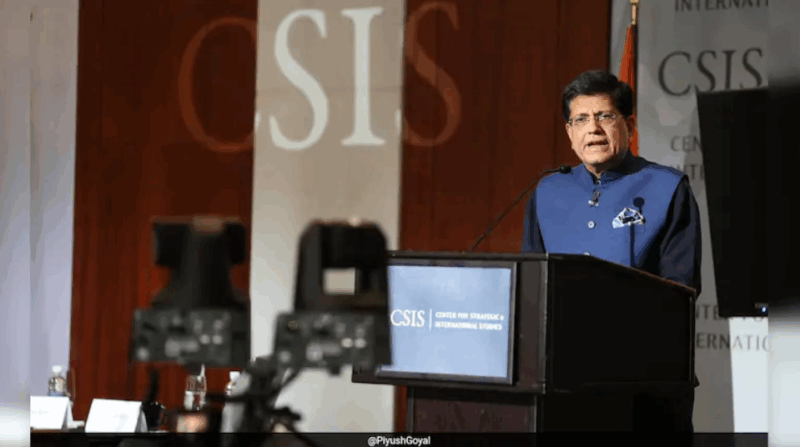
India will expand its trade ties with nations that will offer fair, balanced and equitable free trade agreements (FTAs), Commerce Minister Piyush Goyal said on Wednesday, stressing that the country’s gains must match its offer of accessing a 1.4 billion-strong, and fast-growing consumer market.
He said that India is negotiating FTAs with different countries and regions, including the European Union (EU) and Oman.
The remarks also assume significance as India is negotiating a bilateral trade agreement with the US. The aim is to finalise the first phase of the pact by the fall (September-October) this year.
“So we will be expanding our trading relations with countries where we get a fair deal, where we can have equitable and balanced free trade agreements, where India’s gains commensurate with what we are offering, a large market of 1.4 billion people, growing market, the world’s fastest growing economy,” he said here at India-Middle East-Europe Economic Corridor (IMEC) Conclave 2025.
He added that this corridor would help promote trade, seamless movement of goods and people, and cut down logistics costs.
Billed as a pathbreaking initiative, the IMEC envisages vast road, railroad and shipping networks among India, Saudi Arabia, the US and Europe with an aim to ensure integration among Asia, the Middle East and the West.
The IMEC was formed on the sidelines of the G20 Summit in September last year in Delhi. An agreement was signed by India, Saudi Arabia, the European Union, the United Arab Emirates (UAE), the US and some other G20 partners for the corridor.
Goyal said that it can also open up opportunities for the financial world.
“We could have multilateral financing agencies along this corridor to help promote both the setting up of the corridor and at some stage…we should explore innovative financing models and see how this could finally be financed. For example, we have had green bonds in the past…long-term, 50-year, 100-year bonds to finance this kind of infrastructure,” he said.
He added that the countries can look at harmonising regulatory practices, and enhanced alignment on process, procedures, trade practices, customs union and paperworks within these nations.
“For example, the UAE and we are already engaged to bring some alignment in our regulatory practices. If this region has to really be successful, we can’t have border checkpoints at every level, so we’ll have to look at regulatory connectivity also. So procedures, processes, regulation, all will have to be aligned to make this corridor a bigger success,” Goyal said.
He emphasised that there would be a need for a railway system also.
“So we’ll have to have more interoperable systems going forward. If you have highways, then we need some interoperable charging infrastructure across highways if we are promoting electrical mobility. So we’ll have to think through all of these possibilities and bring nations together,” he said adding these measures would ultimately add to scale.
The member countries will have to look at a multi-faceted dimension that this project offers.
“For example, like UPI, you could have common payment systems, enabling money flow to be easier, and could be settled periodically, monthly or quarterly, in the reserve currency of the globe, or in dollars. But on a day to day basis, every transaction will not need to go through several iterations, only making the banks richer and adding to the cost of transport or cost of trade,” the minister said.
He informed that India and the UAE have been in a dialogue for a virtual trade corridor.
“Can we extend that through the IMEC corridor?” he wondered.
India, he said, is also in dialogue with Singapore to look at the possibility of having an undersea cable for transporting clean energy.
“I’ve had a conversation with Australia…Singapore is also talking to Australia to see if the Singapore, Australia leg could be connected. We are in dialogue with Saudi Arabia and UAE to see if this leg could be connected,” he said.
Further he said that this project needs to be seen from the lens of public-private partnership as it will help in making it financially viable and it should not be only the government’s initiative.
“I do believe that initiatives will not only reduce the time to transport goods significantly…estimated to be about 40 per cent…bring down transport time, bring down cost of logistics, and therefore make trade seamless across continents, faster, more efficient,” he said adding “I think this can become a new global access of the 21st century”.
The good part of the project, he said, is that it respects sovereignty and it is not trying to foist one idea on everything.









